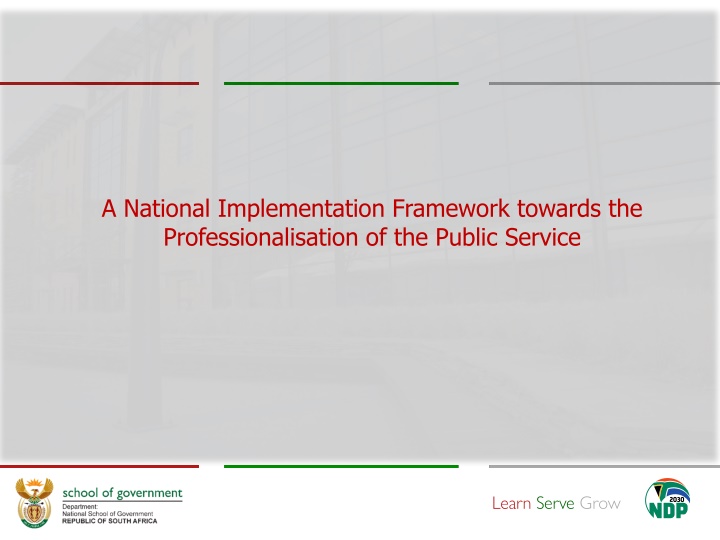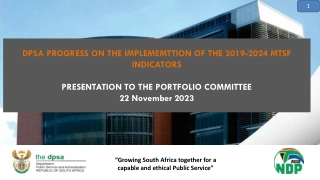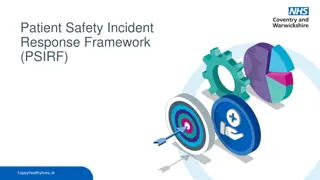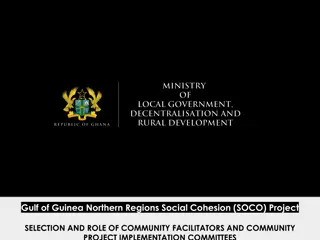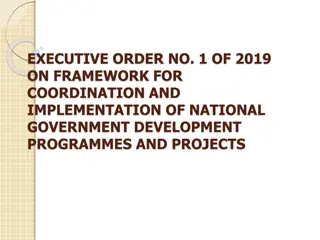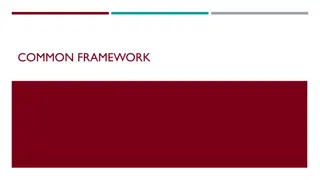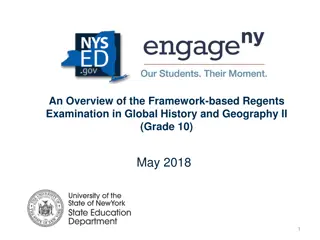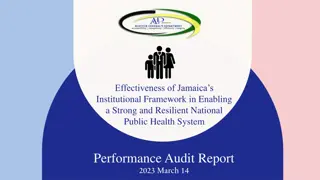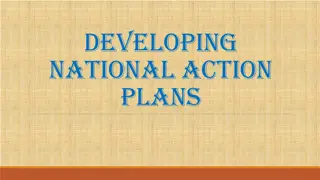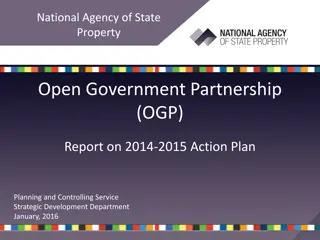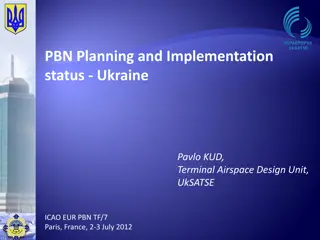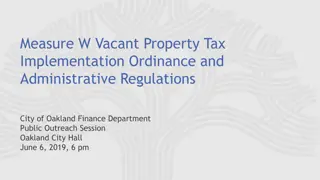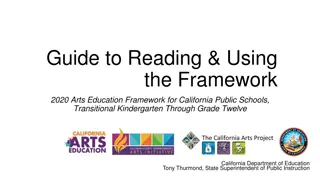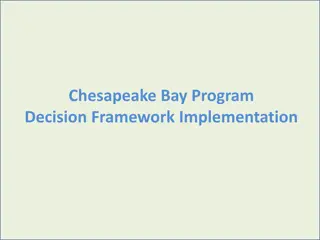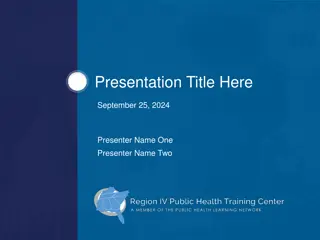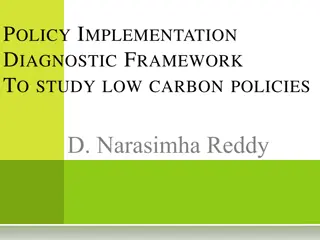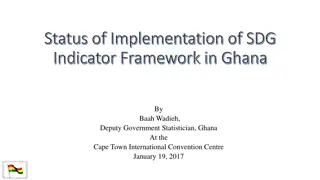National Implementation Framework for Professionalisation of the Public Service
The document outlines the efforts led by the National School of Government and the Department of Public Service & Administration to establish a framework for the professionalisation of the public service. It highlights the key objectives, including conceptual clarity, contextualisation, and key pillars for professionalisation. The approach emphasizes engaging with scholars and stakeholders to facilitate policy changes for institutionalising professionalisation.
Download Presentation

Please find below an Image/Link to download the presentation.
The content on the website is provided AS IS for your information and personal use only. It may not be sold, licensed, or shared on other websites without obtaining consent from the author.If you encounter any issues during the download, it is possible that the publisher has removed the file from their server.
You are allowed to download the files provided on this website for personal or commercial use, subject to the condition that they are used lawfully. All files are the property of their respective owners.
The content on the website is provided AS IS for your information and personal use only. It may not be sold, licensed, or shared on other websites without obtaining consent from the author.
E N D
Presentation Transcript
A National Implementation Framework towards the Professionalisation of the Public Service Learn Serve Grow
Purpose of the Presentation The National School of Government (the NSG) working together with the Department of Public Service & Administration (DPSA), and under the leadership of the MPSA has been tasked with entrenching professionalisation in the public service A technical team of officials from the NSG, DPSA and OPSC conceptualised a draft implementation framework on how to institutionalise professionalisation in the public service Consultations were undertaken within the GSCID Cluster, and recommended for presentation to the Cabinet Committee The purpose of this presentation is to outline the key aspects of the work undertaken thus far and to note the process of seeking public comment, consultation with key stakeholders and submitting a final framework for the approval of Cabinet Learn Serve Grow 2
Objective of the Presentation This objective of the presentation is to outline the draft national implementation framework towards the professionalisation of the public service, including the following: Conceptual clarity on profession, professionalism and professionalisation Contextualisation of professionalisation of public service Conceptualisation of professionalisation and what this means for the public service Key pillars for professionalisation of public service Way forward Learn Serve Grow 3
Approach of this Framework The work of professionalizing the public service is a bigger project of strengthening state capacity thus it must be seen as one element of the bigger project There has been a sampling relevant literature on professionalisation of the public service and a need for robust engagement with scholars and stakeholders on how the state can professionalise the public service. This should culminate in policy or legislative changes to institutionalize professionalisation There has to be a clear implementation framework and plan that recognises the complexity of the public service given that some professions are regulated through established bodies, e.g. Law, Education, most of the health related areas such as Medicine, Nursing, Pharmacy, Finance, Engineering etc. There are other areas that are not regulated by external structures/ bodies One aspect is to profile the different categories of professions and their existing modes of external regulation or non-regulation and to explore whether the state should establish a professional body, especially governing the SMS All those on occupational specific dispensation (OSD) should be compelled to register/belong to professional organisations given that the OSD was created to recognise different types of specialists and the need to remunerate them in manner that is comparable with their counterparts in other sectors Learn Serve Grow 4
Backdrop The Diagnostic Overview (2011) outlined the need to improve skills of public servants but also the following: The erosion of the State s role in producing skilled professionals (e.g. closure of teacher and nursing colleges) The erosion also applies to the training of engineers, planners and artisans. Past practices of engaging professional institutes in the training, selection and development of senior managers have diminished, while bodies like the Institute of Municipal Finance Officers and Municipal Engineers have little influence over appointments to critical positions The result has been a reduction in the number of professionals available to the State, and a looming crisis in the generational reproduction of professional expertise as the ageing cohorts continue to leave the system. It may be argued that in the 26 years later, there has not been decisive interventions to professionalisation the civil service there is a greater fixation on compliance whilst neglecting to determine how compliance impacts on matters of professionalization and performance There is an acknowledgement that significant amounts of work (NDP, reports, documents, roundtable discussions, etc.) has been undertaken to problematize capacity challenges - this work builds on that Learn Serve Grow 5
Backdrop Why the need for professionalising public administration? Skills, a professional ethic and a commitment to public service should be recognized and valued at all levels of the public service and local government Many skills can only be developed on the job, but staff are often promoted too rapidly, before acquiring the experience needed for senior posts. This is in part a reflection of skills shortages in broader society; but specific interventions within the public service can help ameliorate this Services cannot be delivered without people with the necessary specialist skills and knowledge whether they are nurses, doctors, engineers, planners or artisans There is a shortage of professional skills in government, particularly at the local level Government requires engineers to build, maintain and operate infrastructure. Even when these functions are contracted out, government needs to have the technical expertise to commission and oversee contractors (NDP, Chapter 13) Learn Serve Grow 6
International Comparison Learn Serve Grow 7
Professionalisation: Comparing with other countries PEOPLES REPUBLIC OF CHINA Development of meritocratic public service traced back to examinations for the bureaucracy of successive dynasties in Imperial China Imperial Examination System introduced in the second century BC (Emperor Wu of Han) applied with mixed consistency, but from sixth century it made possible selection of most talented officials for government office, lasting more than 1300 years (from the Sui Dynasty 587 AD, to the end of Qing Dynasty, 1904) The civil-service exam (longest continuing Public Administration exam) largely consisted of an open written exam, entailing formal discussion of Confucian classics (Confucianism: the ruler to deliver at least food and peace to the people) the link made between traditional Chinese education and politics China developed a centralised, uniform system of bureaucratic administration capable of governing a huge population, with a system of impersonal, merit-based bureaucratic recruitment, more systematic than Roman public administration (Fukuyama 2011) Although the Chinese system was prone to nepotism, caused by the influential families, the exam assisted with ensuring meritocracy exams open to any citizen Learn Serve Grow 8
Professionalisation: Comparing with other countries INDIA India administer exams for entry into the civil service to take the exams candidates must have a university degree, be at least 21 years old (not exceeding 30 years) The upper age limit for Scheduled Caste/Scheduled Tribes (SC/ST) candidates is 35 years and for Other Classes (OBCs) to address inequality While each state has its own cadre of civil servants, the central administration has the Central Services (over 20, in all), divided into Groups A, B, C and D), and there is also the unique cadre, the All-India Services, serving both the Centre and the states The Union Public Service Commission (UPSC) is responsible for recruitment and selection of personnel to both the All-India Services and the non-technical Central Services to fill the annual need as requested by various ministries and departments The entry exam is open for all citizens subject to pre-qualification The exam for higher civil servants consists of three parts: Part 1 is multiple-choice based aptitude test. The unsuccessful candidates are eliminated. Part 2: is essay type. Part 3: is a personality test. Learn Serve Grow 9
Professionalisation: Comparing with other countries REPUBLIC OF KOREA (SOUTH KOREA) Ministry of Personnel Management responsible for Recruitment, Education and Training National Civil Service divided into Career Service (recruitment, qualifications, performance, permanent life-long work, groups and classes) and Non-Career Service (appointed by election, National Assembly approval, no permanent job status) Recruitment processes and criteria: General principle: Open competition recruitment to reinforce the merit system, recruitment of talent and experts Evaluation method: Liberal arts knowledge test, specialized knowledge test (law, etc.), tests competency and qualification as public official, aptitude tests and competency interviews Open competition recruitment: No restrictions for application, admissions based solely on exam and assessment results Special or career competition recruitment: Selecting those with specific academic qualifications, careers, need to pass Recruitment Exam for Private Sector Experts Issues of gender, disability, regional talent considered in recruitment Promotion requirement: minimal lengths of service at specific grade, competency assessment, screening and re-screening by Promotion Review Board Learn Serve Grow 10
Professionalisation: Comparing with other countries OTHER EXAMPLES Most countries (for example Australia, Botswana, Rwanda, South Africa, UK and USA) do not have general exams like China, India, South Korea France: civil servants generally recruited through competitive exams (specific qualifications, professional experience and age; and internal exams reserved for certain positions) South Africa: specific requirements linked with posts, and recent implementation of an online Pre-entry course for SMS positions (Nyukela) open to all, must be completed. Prospective senior managers to successfully complete competency test additional to interviews contrast no competency tests for posts below SMS Countries apply different approaches: could require a combination of interviews and competency tests as part of recruitment processes Although countries might not have compulsory general public administration tests/exams, they have in- service capacity building/training linked with probationary periods and overall performance management Learn Serve Grow 11
Fundamental aspects of professionalisation Learn Serve Grow 12
Fundamental Aspects of Professionalisation Professionalising means changing attitudes and behavior towards serving the public. This is a values aspect which is about observing and serving in accordance with the Constitution, Batho Pele and the Public Service Charter. We must serve people with empathy Professionalising means having qualified people who know what they are doing and are fully equipped to perform their jobs with diligence. This entails continuous development (like all crew members return to the simulator regularly) which helps sharpen know how and make public servants competitive Importantly, this requires the creation of professional categories in the public service which means, just like health workers must be recognised as and belong to professional bodies (their trade is regulated), we need to expand this and cover as most of the public service as possible especially in senior management. This means government must employ (or train towards) admitted officers of the court (not just people with law degrees), registered engineers and project managers (not just people with engineering qualifications) and in the long term, CFOs must be members of accounting bodies. Further, introduce pre-entry exams across levels and compulsory integrity tests. Professionalising means having a public service that is non partisan. It must be depoliticized. In other words, departments must be insulated from the politics - the mandate of the bureaucracy is to loyally and diligently implement the political mandate, but not to be political actors themselves To achieve this requires few decisive reforms including extending the tenure of HoDs (work towards the Permanent Secretary dispensation), create the Head of the Public Service (the DG in the Presidency - as envisaged in the NDP), implement occupation specific competency assessments (not just generic competency assessment currently in use), rotation of HoDs every 7 years (also implement the revolving door policy and make secondment policy more flexible) and involving the PSC or their nominated experts in the interviews of DDGs and DGs. Learn Serve Grow 13
Fundamental Aspects of Professionalisation That all public servants become a composite group of workers, subject to a single dispensation of professional registration and regulation, predicated on the view that they all work for the state in order to deliver a range of services to the people. This is seen as inextricably linked to the notion of the establishment of a single public service That it refers simply to the subscription by all public servants to the values espoused in the Public Service Charter. In this sense, it means public servants are only required to live the commitment of upholding the principles of Batho Pele - showing empathy towards the plight of the citizenry, especially those who rely on government goods and services for their daily living The uninterrupted career longevity of public servants who are simply there to do their job, regardless of any political changes or of the administration - professionalisation is considered as the creation of an environment that insulates public servants from any political interference as a precondition for government becoming an employer of choice by people who wish to pursue their job careers for a life time Refers to according full recognition of the various professional categories within the public service, which are subject to registration with professional bodies regulated external to the public service. In addition, it also refers to the creation of additional various professional categories of workers, linked to some form of training, which would lead to the external regulation of such categories of workers, held to a particular standard, code of conduct and ethics Learn Serve Grow 14
Fundamental Aspects of Professionalisation Importantly, what does professionalisation mean and look like within the developmental state? It means developing a nuanced understanding of the developmental State and the context in which the majority of our citizens live Understanding of what it means to be a Servant before the people Paying due attention to the specific circumstances of the people in our policy making, policy analysis and policy implementation roles Understanding the interconnectivity between the decisions public servants do or do not make and the impact on the livelihoods of poor people It means being responsive and being diligent and remaining with a task till it is resolved Learn Serve Grow 15
Fundamental Aspects of Professionalisation Example: Person X appointed as a Director for Legal Services. Professionalism (Individual) Professionalism as an individual subscribing to Batho Pele, Code of Conduct, Public Service Charter how person X behaves as a public servant, serves the citizen, exudes the values and ethos Professionalisation by the employer (State) value chain issues how person X is recruited, inducted, performance managed, capacitated, career incidents Profession as a discipline how person X is registered with the Bar Council and subscribes to the professional registration Professionalisation (Sector) Profession (Discipline) Learn Serve Grow 16
1. Professionalism the public servant Public values and ethics should be introduced as part of school and tertiary curriculum to build a cohort of citizens and public servants who are ethical and values driven. Similarly, the public must be included in ethics awareness programmes and in the promotion of the constitutional values and principles 1. The Constitutional Values and Principles must be embedded in the pre-employment training and development of all aspiring public servants and public representatives to ensure a level of professionalism that is consistent with the Constitution, including integrity tests 2. Learn Serve Grow 17
2. Professionalisation the State as employer Promotions into leadership positions in the Public Service should be grounded on principles of technical competence (qualifications plus proven effective experience), integrity, responsibility, accountability, transparency and commitment to the eradication of poverty, unemployment and inequality. Therefore, recruitment and selection instruments should be broadened to address the different elements of professionalism 1. Ethical standards must be effectively communicated to employees and employees must undergo continuous training on ethical issues that confront their departments and professions. Ethics training is necessary to integrate ethical decision-making into the organizational culture and to reinforce ethical choices and accountability 2. The Code of Conduct should be supported with a framework to deal with corrective action because if unprofessional conduct is not sanctioned or punished, it gets elevated to a position of acceptable/ tolerable behaviour and this gets repeated because of such indirect reinforcement. Therefore, consequence management is important to deter unethical conduct and other forms of unprofessional conduct 3. Learn Serve Grow 18
2. Professionalisation the State as employer We delved deeper into as many relevant pieces of legislation (national and municipal) there is sufficient references to professionalisation and professionalism to support this framework. However, we must delve deeper into other pieces of legislation that cover SOEs and organs of state to establish references or requirements for professionalisation 4. Based on the current guidelines and directives, we should start this work focusing on professionalising the Senior Management Service (SMS) before embarking on levels lower supported by chapter 5 of PSR, the SMS Handbook, Directive on SMS Capacity Development, SMS pre-entry 5. Competency assessment has been introduced for members of the SMS. However, the competency framework contains generic management competencies and does not test candidates against the functional or task requirements of the job review of competency tools 6. Whilst there is a handbook for the appointment of persons to boards of state controlled institutions or State- Owned-Enterprises (17 September 2008), more work needs to be done within the SOE space engagements with Public Enterprises & SOE oversight functions is critical 7. Public Service occupations should be mapped/catalogued in order to identify the well established and emerging professions that exist in the Public Service as well as the levels and benefits of external professionalization linkages. The existing salary classification system (SMS, MMS, OSD and etc.) is not effective for the purpose of professionalising the Public Service profession(s) 8. Learn Serve Grow 19
2. Professionalisation the State as employer Career Progression and Career Incidents Continuing Learning and Professional Development Planning & Performance Management Induction and Onboarding Pre-entry, Recruitment & Selection Learn Serve Grow 20
Pillar 1: Pre-entry, Recruitment & Selection This foremost pillar has to be influenced by pre-set education and training (provided by HEI or other recognized institution). It is also supported by a pre-public service entry training, test or exam (section 4 of the Public Service Act mandated to NSG) The NSG rollout of the Nyukela programme a pre-entry to the SMS is being successfully rolled out and serves as part of the professionalisation of the SMS. This is also applicable to serving SMS Government set minimum competency requirements (SMS & MMS in national and provincial government, MMs and managers in municipalities) DPSA Directive (2011) provides for existing SMS to be subjected to competency assessments for purposes of identifying skills / developmental gaps and be incorporated into personal development plans Learn Serve Grow 21
Pillar 1: Recruitment & Selection There is a need for review of recruitment and selection policies and procedures to change the game towards a more meritocratic public administration. Such review must focus on issues such as: Consideration of other forms of recruitment beyond advertising (e.g. processes to recruit persons with disabilities can be done through headhunting or registered agencies) Use of external experts (from any sector) in screening and interviews for positions, particularly technical and specialist positions Determine the role of the PSC in interviews for top management Define a clear policy on succession planning in public administration The implementation of the Graduate Recruitment Programme and the Internship Programme for entry level positions The Internship Programme needs to be ramped up - currently interns are in the system for 2 years and are released. We need to find a way of harnessing their skills and create a link to employing them where there are vacancies Learn Serve Grow 22
Pillar 2: Induction and On-boarding Induction into the Public Service must take place same time with Workplace Orientation. It is important that employees undergo a workplace orientation to better understand the workplace and dynamics The current experience of being inducted months or years after appointments do not add value. Whilst the Compulsory Induction Programme (CIP) and Executive Induction Programme (EIP) remain key programmes towards professionalisation, the reality is the time lag from appointment to CIP/EIP registration to CIP/EIP completion is long. There needs to be faster workplace orientation Perhaps there is a need for an immediate commencement of CIP/EIP even before taking up a public administration position (e.g. induction models of China and India). Alternatively, there may also be a need for mentorship programmes (especially SMS, specialist and technical positions) in the first six months of appointment An alternate option could be that Induction curriculum should be covered as part of the pre- appointment/ promotion training programmes. This could be availed online and a directive be made that prospective public servants need to complete this prior to applying in the public service - similar to the Nyukela Programme. There is also a need for occupational specific knowledge sharing (e.g. engineers in government sharing knowledge amongst each other/ a community of practice ) Learn Serve Grow 23
Pillar 3: Planning & Performance Management The third pillar of the value chain builds on induction and onboarding towards an effective performance management system Key aspects of professionalisation must be emphasised in the performance management and appraisal systems, including performance standards and assessment instruments for different categories of employees Performance management can also be aligned with professional bodies/ associations registration The performance management system must also create the space for innovation and risk taking Learn Serve Grow 24
Pillar 4: Continuing Learning and Professional Development Pillar four of the value chain builds on towards continuing learning and professional development In this aspect of professionalisation, we use the analogy of the pilot returning to the simulator - cross referenced with the DPSA directive for SMS to be periodically assessed against the SMS competency framework We have to make a determination for a certain category of employees (including SMS, specialist, technical and some key functions of SCM, HR, Finance, and Planning) to be professionalized and certification with professional bodies. For example, an engineer may be qualified in her/his field but not professionalized through the Engineering Council to be able to certify or sign off projects. We must change this in public administration Considering the PSC recommendations, the NSG must determine the appropriate training and learning pathways to assist in the professionalisation of these categories of employees Consider a Continuous Professional Development (CPD) points system and further studies Legislation (and the Public Service Charter) is clear that public servants must avail themselves for training, and this must be compelled as far as possible Learn Serve Grow 25
Professional development linked to service delivery This slide that follows refers to the life journey of the public servant career 1. Readiness to work a new recruit must be orientated to the Constitution, Values and Principles, the regulations guiding the public service and its ethos. They must also be oriented to their office building, their supervisor, the nature of their work and performance requirements. Research shows that a good induction programme leads to reduced career incidents, greater assimilation and greater employee satisfaction 2. Functional at work the official has a very good understanding of the public service environment, ethos and values and principles. The application of the rules as pertains to government policies, able to navigate the social, political, ethical, cultural and governance space with comfort 3. Excellence at work with the fundamentals in place, the employee develops their management and leadership skills in order to deliver excellence at work through sound, authentic and values based management and leadership. 4. Relevance at work from time to time the employee is required to maintain their professional compliance, remain up to date with the current discourse in their field of work, and find opportunities to expand their horizons. This is usually done through short courses, webinars and seminar sessions 5. Performance at work the employee has reached a high level of competence, adaptability and agility in the organisation clear strengths in all the competency areas and at this point is usually able to mentor others professional development is at the level of mentoring for self and others, as well as coaching for performance Learn Serve Grow 26
Professional development linked to service delivery Excellence Leadership development Relevance Continuing professional development Functional Management & skills development Service Delivery Performance Doing what needs to be done to ensure delivery Readiness Induction Development within the public service and for the public service Learn Serve Grow 27
Pillar 5: Career Progression and Career Incidents The State must address the meritocratic public administration in a democratic public administration. The MTSF (2019-2024) determines a professional, meritocratic and ethical public administration that has to develop professional capabilities in the following areas: Knowledge and skills; Financial management; Governance and accountability; Infrastructure/facilities and equipment; Operational (business process and practice); ICT Project Management and etc. The Revolving Door Policy (2008) provides for the movement of SMS between private sector, academia and the public sector to provide with fresh, current and inspirational learning and innovative ideas . The enablers of the Revolving Door relationships are: Secondment of an SMS/HOD to academic or other institution Secondment of candidates from academia or other institutions to public service Granting of sabbatical leave to SMS/ HOD (and other levels of employees in the form of special leave, e.g. legally trained people who want to be admitted as attorneys/advocates) Learn Serve Grow 28
3. Profession (Discipline) Characteristics of professional communities: Voluntary networks and forums These are usually fluid communities formed around common projects and interests, with shared convenor or facilitator roles, e.g. mentorship circles, research and innovation forums, and peer review networks Formal bodies Formally regulated communities take the form of registered associations or professional bodies, e.g. Psychological Society of South Africa (PsySSA), South African Council for Educators (SACE), South African Communications Association (SACOMM), Association of Chartered Certified Accountants (ACCA) They generally have the following features: established code of conduct / ethics; membership and affiliation fee; influence curriculum in a specific discipline / professional field; set board exams; issue professional licences; set requirements and procedures for continuing professional development; make sanction decisions; host annual conferences; host a recognised journal; possess a board. Learn Serve Grow 29
3. Profession (Discipline) There will be a need to identify the professional communities that are operating within the various disciplines to collaborate with government departments and institutions of higher learning Such professional communities will include: South African Institute of Chartered Accountants (SAICA) Engineering Council (engineers and project management) Bar Council Institute of Public Finance and Auditing Various associations of Public Administration and Management Public Relations Institute of South Africa Institute of Directors Learn Serve Grow 30
3. Profession (Discipline) In the short term (2021-22), the State should aim to strengthen state capacity and professionalise key functions in: Supply Chain Management Financial Management Human Resource Management & Development ICT Risk Management & Business Continuity Organisational Planning and Performance Management Engineering and Project Management Corporate Governance/SoE Oversight Officials (be IoD Certificated) Over the medium term (2023-2025), the State should determine the core competencies and professionalisation standards in specialist and technical skills necessary for the economic and social sectors (PSC Report) Learn Serve Grow 31
3. Profession (Discipline) Professional communities for public administration: As there are many types of services rendered in public administration (three spheres of government, pubic enterprises, and organs of state), also many disciplines, professions, semi- professions and networks upon which public servants draw for professionalisation and expertise. A Professional Association for the SMS (DPSA Discussion Paper) was mooted just after the SMS was established, in 2001, to advance the following, among others: Provide a collective identity for the senior managers Serve as a forum for senior managers to share ideas and good practices, and facilitate the intellectual debate that needs to take place from time to time Standardise values of the senior management service Serve as a centre that accredits individual senior managers learning/ qualification/ experience levels as well as accrediting organisations/institutions Possibly function on the same principle as the cluster system of government The Discussion Paper added: The establishment of a professional association must be done with great caution to prevent misguided efforts and to ensure that its existence is justified and that it serves the right purpose This is not a bargaining but a professional forum like SAICE Learn Serve Grow 32
Implementation The draft framework was presented to the Governance, State Capacity and Institutional Development (GSCID) Cluster and Cabinet Committee for inputs. As part of the implementation of this framework, the following will also be considered Whilst the framework places emphasis on the SMS, it will eventually cascade throughout the entire public sector. It may be prudent, for some category of public servants, to rather start at the lower levels and cascade upwards. Therefore the framework will not focus exclusively on the SMS The consultations with identified professional bodies and all other stakeholder engagements, as well as on scoped modalities of introducing integrity testing must be undertaken prior to presenting to Cabinet for approval Consultations with the Council for Built Environment (CBE) and the Justice College have commenced, whilst other bodies are being identified for consultation Other identified bodies and stakeholders already identified for consultation include: Engineering Council, SAICA, Legal Practice Council, SAAPAM and SAQA Learn Serve Grow 33
Consultations Key among what is being sought through these processes include: Why we need professionalisation in the public service and what effect it will have on state performance in terms of execution diligence. What must happen in the different areas of the public service to enable professionalisation. Which aspects of professionalisation will be necessary for recruitment (e.g. pre-entry exams and tests) and career management of public servants and public representatives. What policy and legislative reforms (e.g. occupational specific dispensation) that may be necessary to professionalise the public service. What opportunities will professionalisation of public servants provide in terms of lifelong learning, development and recognition of prior learning. How the professionalisation framework can influence higher & further education curriculum and how must higher education adjust. What kinds of partnerships may be formed with professional bodies and associations in furtherance of professionalisation, development, accountability and consequence management. Learn Serve Grow 34
Thank you Learn Serve Grow 35
